The evangelical women who reject Trump
- Published
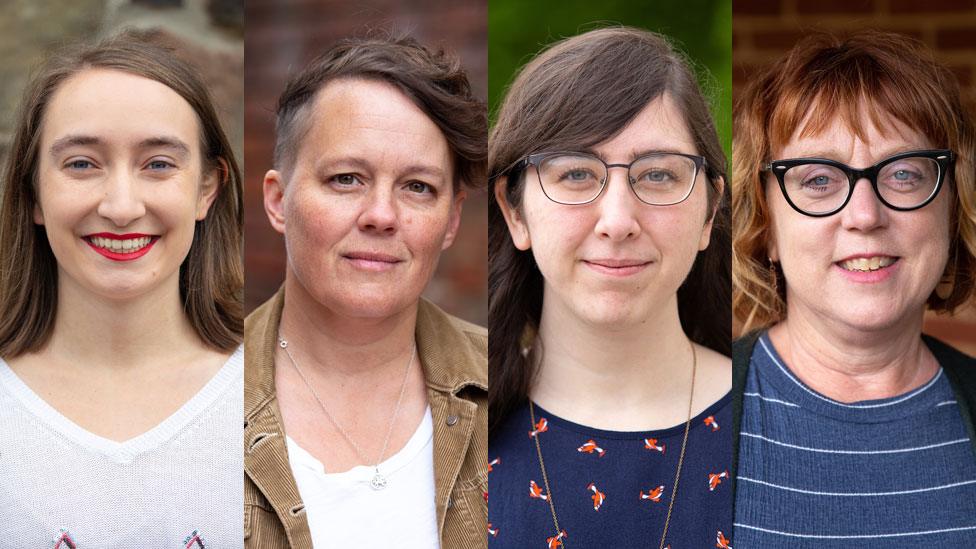
Rebecca Olsen, Heather Quintero, Rebecca Pickard and Karen Swallow Prior
Evangelical women helped Trump get elected. Now some of them are turning against him and his candidates - and could sway the outcome in key elections in November.
Rebecca Olsen, 21, a Southern Baptist who dresses conservatively in classic-red lipstick and black, ballet-style flats, was "gung-ho" for Trump in 2016.
She had concerns about the way he treated women, she says, but she brushed them aside.
"At the time I let a lot of things slip," she says. "And upon the past two years of reflection, I regret being so much in favour of him."
Since then the treatment of women has become a core issue for her and for others across the US. The MeToo movement brought the subject of sexual harassment onto centre stage last year, with a similar phenomenon, the ChurchToo movement, unfolding within the Southern Baptist community.
The hearing of Supreme Court Justice Brett Kavanaugh opened up wrenching discussions about sexual assault.
A life-long Republican who was raised in Atlanta, Olsen says she has turned against the president and his endorsement of candidates are a mark against them.
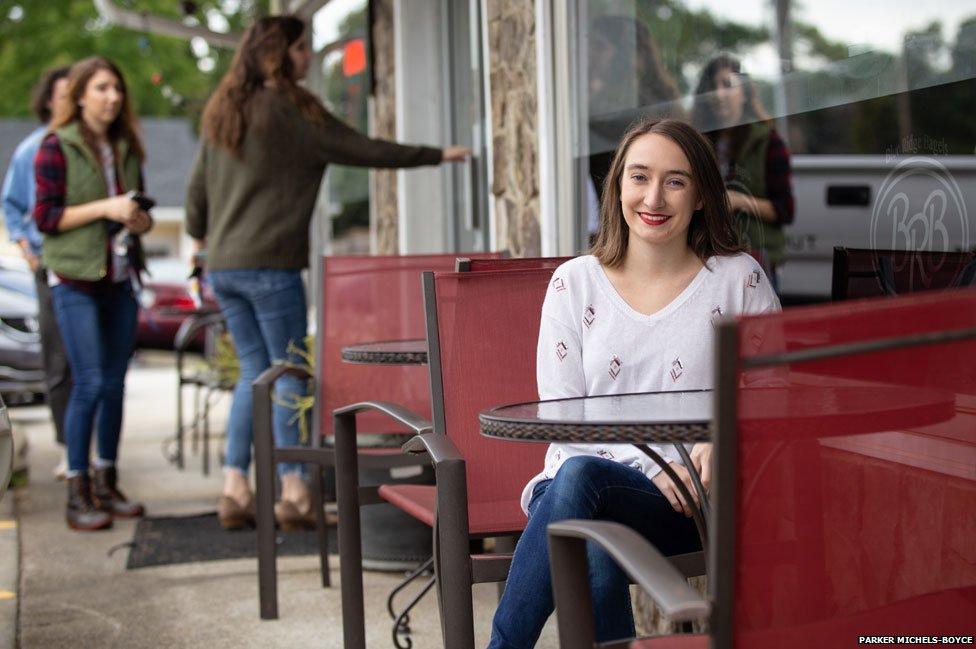
Rebecca Olsen
"I think we should be doing our best to empower women," she says, explaining why she's disillusioned with Trump. "I think the president should be doing that as well."
She describes the demeaning way that he talks about women and says: "I question myself: 'Rebecca, how could you be so in favour of this man?'"
Her disappointment with the president and her rejection of his candidates is even more striking because of the backdrop.

Does your faith influence your vote?

Tell us how religion plays a part in the mid-terms for you
Email us at AskAmerica@bbc.co.uk

She's standing outside a restaurant that's filled with her classmates from Liberty University, the nation's biggest evangelical college, in Lynchburg, a town known as the "buckle in the bible belt".
As a Trump critic, Olsen's in the minority. Students here voted overwhelmingly for Trump and are campaigning for his candidates, a roster that includes Corey Stewart, a Republican who's campaigning for the US senate in Virginia and is, as the New York Times reports, external, supported by white nationalists.
Liberty University is run by Jerry Falwell Jr, the son of the nation's most famous evangelical. Falwell brags about his friendship with the president and lauds his accomplishments in office, telling me: "He's done more for evangelicals than any previous Republican administration."
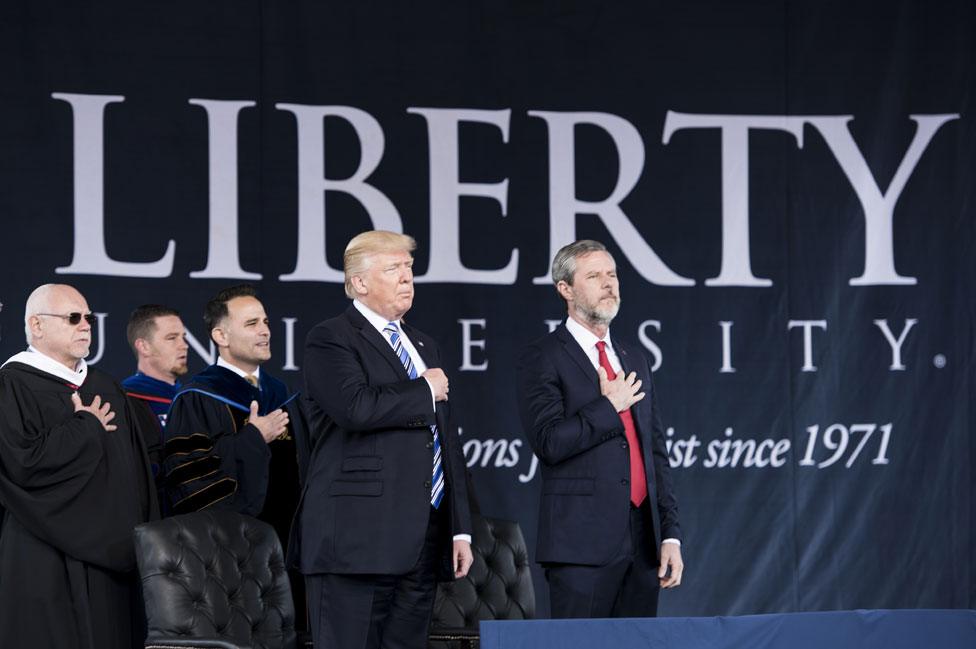
The president with Jerry Falwell Jr (right)
But despite the massive support for Trump in Lynchburg, Olsen's not alone in her views.
Another student, Rebecca Pickard, shows me around the university on a Saturday afternoon, pointing to a Noah's Ark in a children's play area, and says that even in this conservative Christian world, it's OK to reject the president.
"It's not something I feel self-conscious about," she says.
Olsen and Pickard belong to a tiny sliver of this Christian world - white evangelical women who do not like Trump. But their numbers are growing incrementally.
Support for the president among women in their demographic group dropped from 73% to 67% from 2017 to 2018, according to Pew Research Center (in data they have yet to publish). Support for the president among white evangelical men dropped too, from 84-79%.
The decline in the president's approval ratings among evangelical women is not huge, yet many of these women are determined to express their views at the ballot box.
They don't want to vote for Trump candidates in states like Virginia, Georgia and Texas, they say. Although small in numbers, these women could change the outcome in congressional districts where candidates are running neck and neck.

Rebecca Pickard
Evangelical women have already thrown out one of their leaders, Paige Patterson, the former head of the Southern Baptist Convention, because of the demeaning way he spoke about women.
Olsen says that she won't support a Trump-endorsed gubernatorial candidate, Brian Kemp, in Georgia. In Texas, some white evangelical women are supporting Beto O'Rourke, a Democrat, according to the New York Times, external, rather than Senator Ted Cruz, a Republican with a strong evangelical following.
These evangelicals - and their dismay over the way that the president treats women - reflect a broader trend. "A majority of Americans feel that Trump doesn't respect women," says GBA Strategies' Margie Omero, a Democratic pollster.
Some pollsters like FiveThirtyEight have identified a huge gender gap, external between women largely voting for Democratic candidates and men supporting Republicans. So evangelicals are reflecting a wider trend but it's surprising because as a group they so strongly backed Trump in the past.
"I'm amazed and heartened to see evangelical women tackle this," says Jennifer Butler, who grew up in an evangelical family in Georgia and now heads up an organisation called Faith in Public Life.

More on the US mid-terms
The "Pink Wave": How women are shaping the 2018 US elections

Republicans say they're unconcerned, pointing out that the vast majority of white evangelical women still support the president and will choose his candidates in November.
Olsen's twin sister, Rachel, is one of them - she doesn't like Kemp, she tells me, but she'll "begrudgingly" vote for him, explaining: "I don't want the state to turn blue."
One of the biggest mysteries of the 2016 election was that evangelical women helped to usher Trump into office despite the fact that he seldom goes to church and used to live a life some might say was contrary to Christian values.
Before the election, they knew that he'd said vulgar things about women in an Access Hollywood tape and that he'd been married three times. More recently they heard him refer to a woman as "horseface".
Heather Quintero, a math teacher who grew up in Lynchburg, acknowledges that it must be hard for some people to understand why female evangelicals would support Trump, given the way that he treats women.
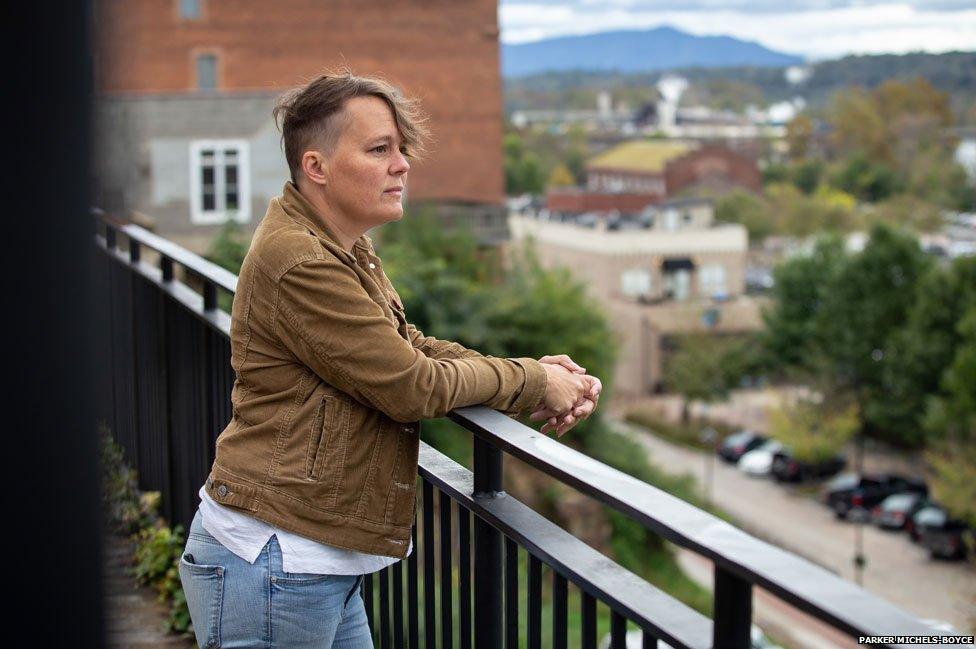
Heather Quintero
She draws on her own experience as an evangelical Christian to help unravel the mystery. As a child, she says, she was taught church lessons such as: "My body does not belong to me."
It "belonged first of all to my father", she says. "When I was married, it would be given to my husband."
Looking back, she sees a connection between these teachings and the support that female evangelicals have shown for Trump.
Evangelical women support Trump "because it's what we've been socialised to do", says Quintero - this means "placing your own well-being below the idea of stopping abortion".
Many don't like the way the president talks about women but support his conservative policies, she says.
Paula White, the president's spiritual adviser, spoke to me recently near the White House about women's issues and conservative politics.
She sympathises with the women who were disturbed by the Supreme Court hearing since she herself was "sexually and physically abused".
She says: "I understand that pain." Yet she applauds the appointment of Brett Kavanaugh, a Catholic who's seen as "pro-life".
She and other Christians applaud Trump and the vice-president, Mike Pence, both of whom are rock stars on the evangelical circuit.
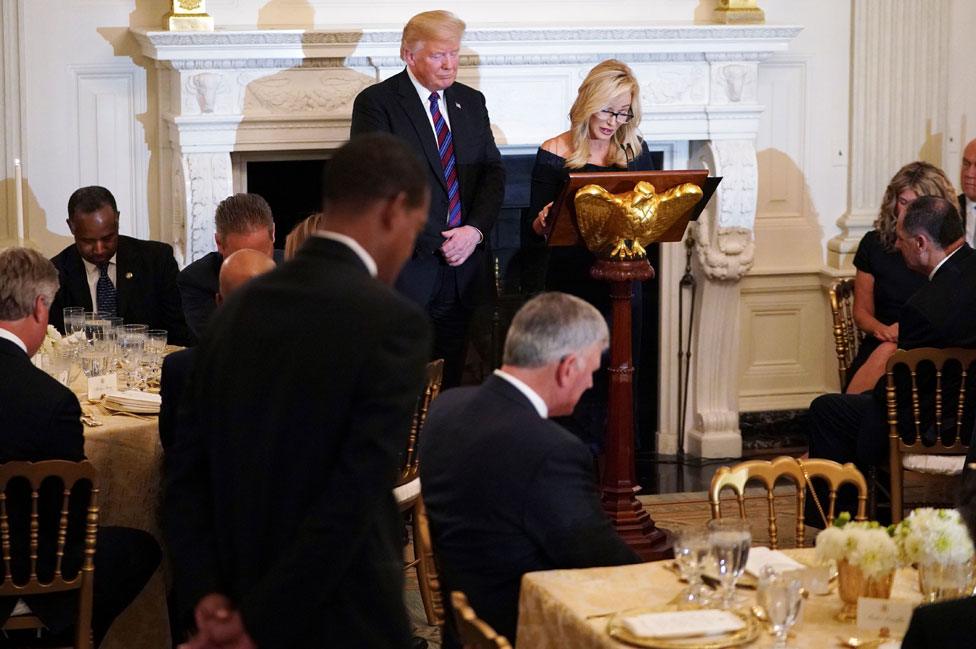
Paula White prays with Trump at the White House
One of their fans is Laurel Bryant, a college student from Amherst, a town near Lynchburg. I saw recently her in a Washington hotel during a "Values Voter" summit after she'd met Pence. "I'm shaking like a Chihuahua," she says, describing her excitement.
Bryant says she hopes that Christian women will stay away from "feminist ideology" and recognise the importance of "compromise" - that means voting for candidates who may be flawed but who are fighting against abortion.
For Bryant and many evangelicals, that's the key issue and seen through this light, the way the president treats women becomes less important.
But just as some evangelical women have expressed their unhappiness with the president, so have some men. Writing in USA Today, external, a Minneapolis pastor, Doug Pagitt, describes evangelicals: "Their insistence on walking in lockstep with the Republican Party often is primarily motivated by a single issue: abortion."
Karen Swallow Prior, a Southern Baptist and an English professor at Liberty University, brought me into the world of evangelical women one autumn afternoon in a Main Street coffeehouse.
Prior is the author of a book entitled On Reading Well: Finding the Good Life through Great Books, and she introduces me to her friends, "Lynchburg Liberals" as she calls them.
These women range in age from 20 to post-retirement, and most are affiliated with the university. They'd be seen as conservatives in US cities because of their hardline stance on abortion but are viewed as progressives in Christian country because of the way they talk about gender issues and because they oppose the president.
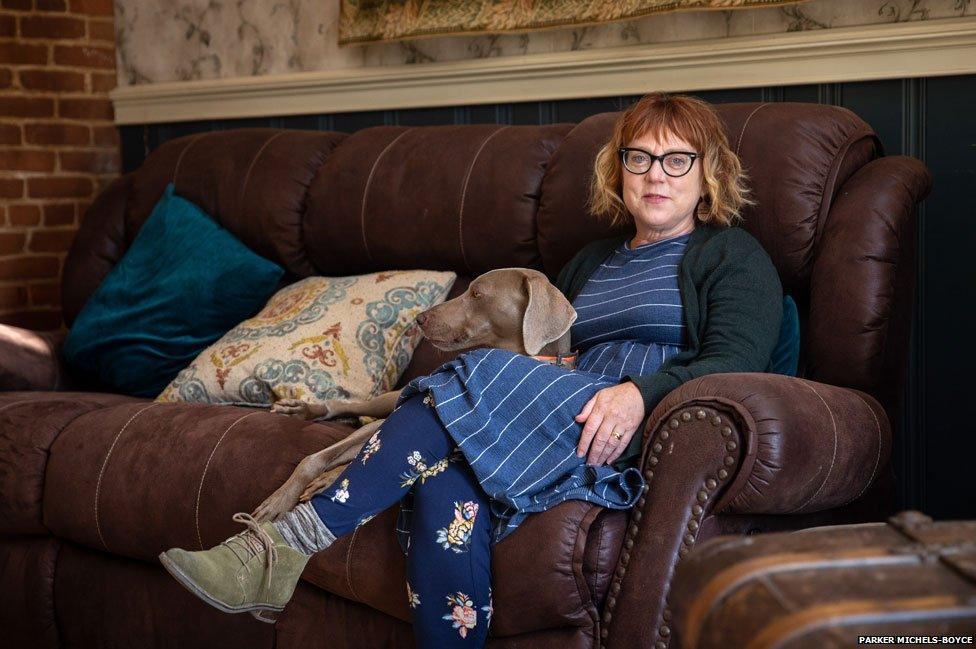
Karen Swallow Prior
They sat around a wooden table with lovers' initials and a universal Christian symbol, the cross, carved into its surface. Outside the café, a student plays on a piano a "worship song" that he wrote himself.
Pickard's grandfather gave her a Winchester rifle when she was in middle school, she tells me, and she grew up listening to Sean Hannity on her dad's car radio.
Despite her conservative upbringing, she's planning to vote for a Democrat, Tim Kaine, a Virginia senatorial candidate, instead of Stewart. "I'd like to vote for someone who won't embarrass us," Pickard says. Quintero says she's also voting for Kaine.
Others baulk at voting for Democrats - but refuse to support the president's candidates. Prior now tells me that she'll vote for a libertarian. Another woman says she'll write in Mickey Mouse, only half-joking.
Democrats have an edge in November's elections, according to polls, but a key factor will be turnout.
"This is going to be so close," White says. Ultimately the fate of the president, the US congress and state-level leaders could turn on a small number of votes cast by evangelical women.
On that day at the restaurant, Olsen says she doesn't see herself as a radical.
Still she concedes that her decision to write in a name on a ballot rather than vote for Trump's candidate is "a protest in some way".
.